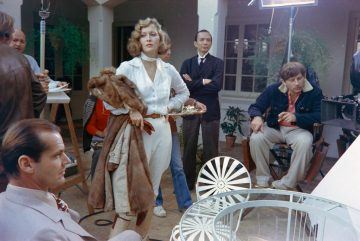Mark Horowitz in The New York Times:
 Fifty years ago, the screenwriter Robert Towne said to his girlfriend, “I want to write a movie for Jack.” He meant Nicholson — in those days, and possibly even now, there is only one Jack — who had just had his breakout role in “Easy Rider.” “A detective movie,” Towne explained. “Maybe Jane Fonda for the blonde.” He knew he wanted to set it in Los Angeles before the war, like a Raymond Chandler novel. But that was about the extent of it. When he told Nicholson, the actor naturally asked, “What’s it about?”
Fifty years ago, the screenwriter Robert Towne said to his girlfriend, “I want to write a movie for Jack.” He meant Nicholson — in those days, and possibly even now, there is only one Jack — who had just had his breakout role in “Easy Rider.” “A detective movie,” Towne explained. “Maybe Jane Fonda for the blonde.” He knew he wanted to set it in Los Angeles before the war, like a Raymond Chandler novel. But that was about the extent of it. When he told Nicholson, the actor naturally asked, “What’s it about?”
“I don’t know,” Towne admitted. “Water.”
This exchange appears in “The Big Goodbye: ‘Chinatown’ and the Last Years of Hollywood,” by Sam Wasson. Not exactly the seminal Rosebud story one hopes to discover in a new history of a favorite film. Still, from that modest inception, great things did come. Four years later, Paramount Pictures released “Chinatown,” written by Towne, directed by Roman Polanski, produced by Robert “The Kid Stays in the Picture” Evans. (Faye Dunaway, not Jane Fonda, played “the blonde.”) And now, almost a half-century later, “Chinatown” routinely appears on the short lists of best Hollywood films, whether they’re generated by the American Film Institute or the BBC. One panel of British film critics even voted it the single best film of all time.
“Chinatown”’s murky and amoral plot — involving a corrupt web of stolen water rights and sleazy land development, behind which lurk the even darker sins of murder and incest — resonated with demoralized Watergate-era audiences. Nominated for 11 Academy Awards, the film lost for best picture of 1974 to “Godfather II,” but Towne won for best original screenplay.
“The Big Goodbye” is part of a welcome and newish publishing trend: deeply researched and elaborately subtitled books about a single movie, which explore and reframe the film as an inflection point within the broader culture. Three recent and admirable examples are “We’ll Always Have Casablanca: The Life, Legend, and Afterlife of Hollywood’s Most Beloved Movie,” by Noah Isenberg; “The Wild Bunch: Sam Peckinpah, a Revolution in Hollywood, and the Making of a Legendary Film,” by W. K. Stratton; and “High Noon: The Hollywood Blacklist and the Making of an American Classic,” by Glenn Frankel.
More here.
